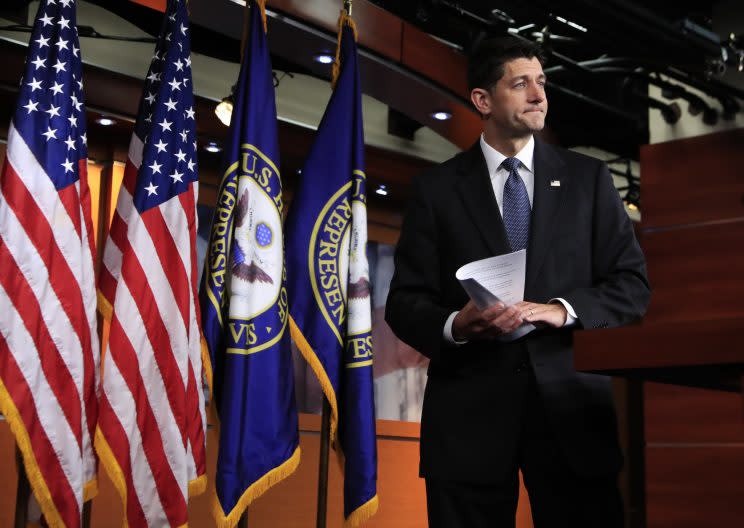Paul Ryan: It’s ‘premature’ to say whether House would pass Senate health care bill
WASHINGTON — House Speaker Paul Ryan, R-Wis., declined to say Thursday whether the House would take up Senate Majority Leader Mitch McConnell’s health care bill if the Republican leader manages to push it through the Senate.
“They’re just beginning their process,” Ryan said, adding he believes it will be a “lengthy” one.
McConnell declared on the Senate floor Thursday that he believes the Senate could pass the sweeping legislation as soon as next week.
The speaker said it was too soon to say whether the House would take up the other chamber’s bill if the Senate passes it.
“It’s premature to say,” he said. “We haven’t made that decision yet.”
McConnell faces the daunting task of convincing at least 50 members of his caucus to vote for a health care bill that dramatically cuts Medicaid funding and so far has been unpopular among the American public. Four Senate conservatives, led by Rand Paul, R-Ky., have announced their opposition to the bill as its written now, imperiling its passage. But if McConnell does manage to get the votes, Ryan suggested the bill would be well received in the House.
He sounded optimistic about the Senate bill, saying it looked a lot like the American Health Care Act he narrowly pushed through the House in May.
“From what I understand, their bill tracks in many ways along the lines of the House bill,” Ryan said.
Senators said in May they planned to start from scratch with their version of the Obamacare repeal and replace, a move that could have alienated House conservatives in the Freedom Caucus who were brought on board with carefully crafted compromises. Rep. Dave Brat, R-Va., a member of the Freedom Caucus, said then the Senate better not change the AHCA “one iota” or risk losing his support.

While the Senate version, called “Better Care Reconciliation Act of 2017,” certainly does change the AHCA by more than an iota, it leaves a key concern of the Freedom Caucus relatively intact: preventing insurance plans from covering most abortions and defunding Planned Parenthood.
Like the House bill, the Senate bill “defunds” Planned Parenthood for one year, which means Medicaid patients couldn’t receive nonabortion health care services at Planned Parenthood clinics for that period. The bill also would prevent any insurance plan sold on the exchanges from covering medically unnecessary abortions except in the case of rape or incest. The Senate bill also discourages private plans from covering abortions by excluding employers that offer them from tax breaks and other benefits.
The bill “could effectively eliminate abortion coverage beyond Hyde restrictions in all plans — including employer plans,” said Laurie Sobel, the associate director of women’s health at the nonprofit Kaiser Family Foundation. Hyde restrictions refer to a 1997 law that prevents federal funds from going to abortions that are not medically necessary or in cases of rape or incest.
While abortion will likely not be a sticking point in the House, conservatives may balk at the Senate bill’s inclusion of subsidies to insurance companies to stabilize the market and a more gradual phase-out of Obamacare’s Medicaid expansion. The Senate bill also does not include the AHCA’s provisions allowing insurers to charge people with preexisting conditions more than healthy people, which could have priced sicker people out of the market. The Freedom Caucus argued that controversial move was necessary to keep premiums down. It’s unclear whether its members will be willing to swallow that change.
But Paul and the other conservative senators opposing the bill may manage to move the legislation to the right, changing the calculus for the Freedom Caucus.
Most GOP House members are still reviewing the legislation and haven’t publicly commented on it yet.
Rep. Mark Meadows, R-N.C., the chair of the Freedom Caucus, sounded positive about the bill on Twitter Thursday, writing he was looking forward to going to “conference.” That suggests Meadows does not want to pass the Senate bill, but rather to reconcile the differences of the two bills in a conference committee.
Reviewing the Senate #healthcare bill–looking forward to going to Conference and following through on our promise to #RepealObamacare pic.twitter.com/doarrtEWEX
— Mark Meadows (@RepMarkMeadows) June 22, 2017
Read more from Yahoo News:



